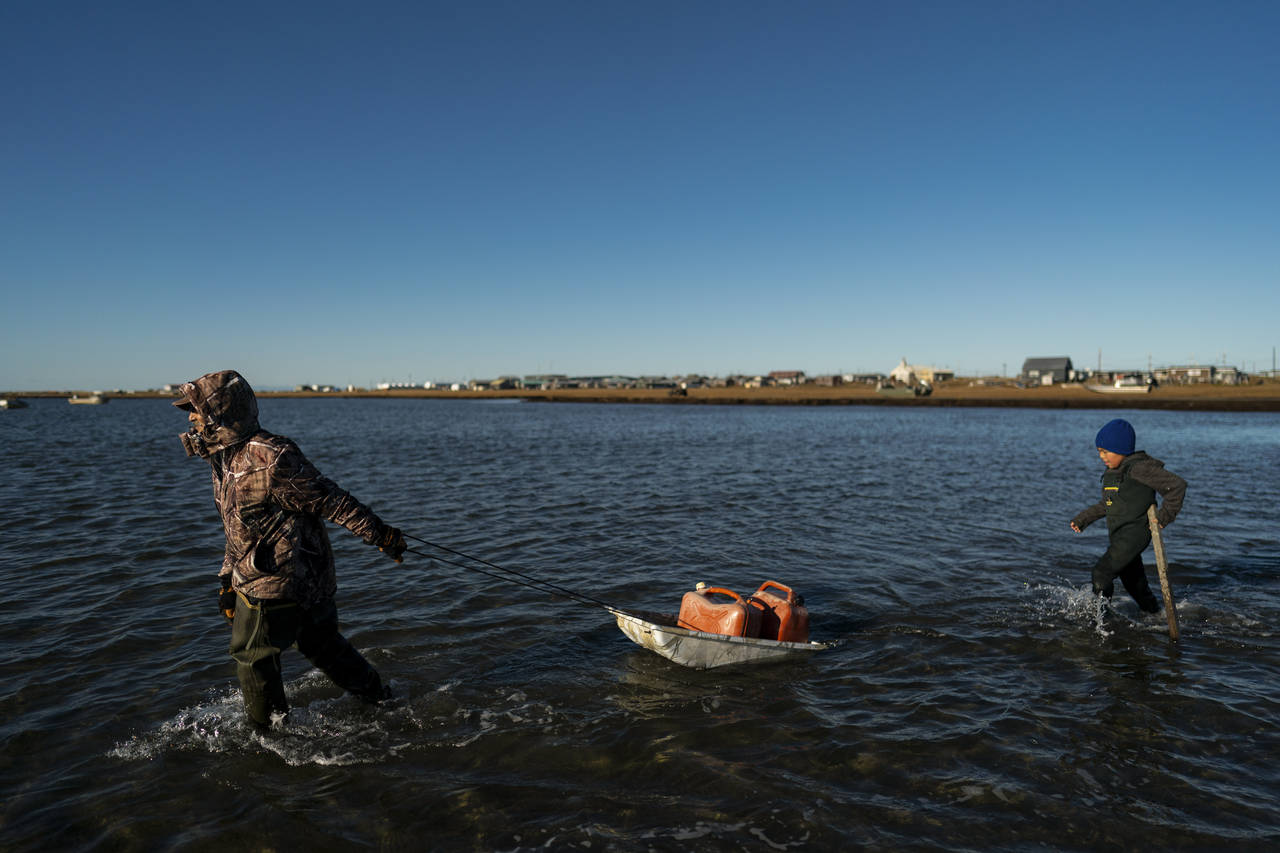Climate Migration: Alaska village resists despite threats
Oct 27, 2022, 5:55 PM | Updated: Oct 28, 2022, 6:15 am

Pulling a sled with fuel containers in the lagoon, Joe Eningowuk, 62, left, and his 7-year-old grandson, Isaiah Kakoona, head toward their boat through the shallow water while getting ready for a two-day camping trip in Shishmaref, Alaska, Saturday, Oct. 1, 2022. (AP Photo/Jae C. Hong)
(AP Photo/Jae C. Hong)
SHISHMAREF, Alaska (AP) — Search online for the little town of Shishmaref and you’ll see homes perilously close to the ocean, and headlines that warn this Native community in western Alaska is on the verge of disappearing.
Climate change is partially to blame for the rising seas, flooding, erosion and loss of protective ice and land that are threatening this Inupiat village of about 600 people just a few miles from the Arctic Circle.
But the dire situation is only part of the story.
The people of Shishmaref are resourceful and resilient, said Rich Stasenko, who arrived to Shishmaref to teach in the ’70s and never left. “I don’t see victims here.”
Yes, residents have voted twice to relocate. But they haven’t moved. There’s not enough money to fund relocation. And perhaps, most importantly, there are no places like Shishmaref. Elsewhere they would be far from prime spots for subsistence hunting, fishing and berry picking that make up most of their nutrition. They would be dispersed from their close-knit community that takes pride in its traditions, and celebrates milestones at their homes, local school and one of the world’s northernmost Lutheran church.
But it’s too burdensome to only dwell on the climate crisis, said the Rev. Aaron Silco, who is co-pastor of the Shishmaref Lutheran Church with his wife, Anna. “There’s still life happening.”
On a recent Sunday, they celebrated Mass with about two dozen parishioners. The Rev. Anna Silco asked the children in the group to gather on the steps of the altar and gave them mustard seeds to explain the parable about keeping faith despite challenges. “A mustard seed can grow into a huge tree,” she told them. “My faith can be as small as a mustard seed and that will be enough.”
Ardith Weyiouanna and two of her grandchildren reflected on how the related to Shishmaref.
“It’s hard to see myself living elsewhere,” said Weyiouanna, whose family first came to Shishmaref with a dogsled team in 1958.
“My home means my way of life, carried down to me by my ancestors – living off the land, the ocean, the air… And it’s important to teach it to my children, to my grandchildren … so they can continue the life that we’ve known in our time and before our time,” she said.
That traditional lifestyle is vulnerable to climate change effects. In Alaska, the average temperature has increased 2.5 degrees (1.4 degrees Celsius) since 1992, according to the U.S. National Oceanic and Atmospheric Administration. The Arctic had been warming twice as fast as the globe as a whole, but now has jumped to three times faster in some seasons, according to the Arctic Monitoring and Assessment Program.
___
EDITOR’S NOTE: This story is part of an ongoing series exploring the lives of people around the world who have been forced to move because of rising seas, drought, searing temperatures and other things caused or exacerbated by climate change.
___
Shishmaref sits on the small island of Sarichef. Only about half of it is habitable, but hundreds of feet of shore have been lost in past decades. A warmer climate also melts faster a protective layer of ice during the fall, making it more susceptible to storms. In 1997, about 30 feet of the north shore was eroded after a storm, prompting the relocation of 14 homes, according to a Alaska Department of Commerce report. Five more homes were moved in 2002.
Today, Shishmaref is one of dozens of Alaska Native villages that face significant environmental threats, according to a U.S. Government Accountability Office report published in May that says climate change “is expected to exacerbate” these threats.
“I’m scared we will have to move eventually,” said Lloyd Kiyutelluk, president of the local tribal council. “I don’t want it to be declared an emergency. But the way things are … we’re getting storms that we’ve never seen before.”
Ahead of a powerful storm in September, officials warned that some places in Alaska could see the worst flooding in 50 years. In Shishmaref, the storm wiped out a road leading to the garbage dump and sewage lagoon, creating a health hazard for a town that lacks running water. Molly Snell said she prayed for a miracle that would save her village from being forced to evacuate.
“The right storm with the right wind could take out our whole island,” said Snell, 35, the general manager of the Shishmaref Native Corporation.
“For someone to say that climate change is not real kind of hurts a little bit because we’re seeing it firsthand,” she said.
On a recent day, she prepared a dinner for the 31st birthday of her partner, Tyler Weyiouanna, who had just returned from a hunting trip. Their meal included turkey, a cake decorated with a photo of him and the last bear he had hunted, and akutuq, an ice cream-like dish traditionally made by Alaska indigenous cultures from berries, seal oil and the fat of caribou and other animals.
Other hunters also returned home that day with a catch of spotted seals that were laid outside ready to be skinned and cured, a traditional weeks-long process that is usually carried out by women. The fur of a polar bear dried in a rack next to the town’s airstrip.
Residents drive snow machines and all-terrain vehicles, but there are no other vehicles on the sandy roads.
“This is not a community that is responsible for greenhouse gas emissions and industrialization to the extent that we know Western Europe and North America have been,” said Elizabeth Marino, an anthropologist and author of “Fierce Climate, Sacred Ground: An ethnography of climate change in Shishmaref, Alaska.” She described it as climate injustice, and some believe this injustice has claimed lives.
Ask John Kokeok about climate change effects and he’ll tell you that he started paying attention after a personal tragedy. His brother Norman, a skilled hunter, knew the ice and trails well. Yet during a hunting trip in 2007, his snow machine fell through ice that melted earlier than usual, and died.
John blames climate change and he has been retelling his story ever since in hopes of warning younger generations and finding solutions to protect Shishmaref. He voted to relocate the community to safer ground. But he also wants to protect their traditions. Only forced evacuation could make him leave now.
“I know we’re not the only ones that are getting impacted,” he said in his living room, near his brother’s photo.
“I’m sure there’s everybody else on the coastline. But this is home.”
___
Associated Press religion coverage receives support through the AP’s collaboration with The Conversation US, with funding from Lilly Endowment Inc. The AP is solely responsible for this content.
___
Associated Press climate and environmental coverage receives support from several private foundations. See more about AP’s climate initiative here. The AP is solely responsible for all content.
Copyright © The Associated Press. All rights reserved. This material may not be published, broadcast, rewritten or redistributed.












